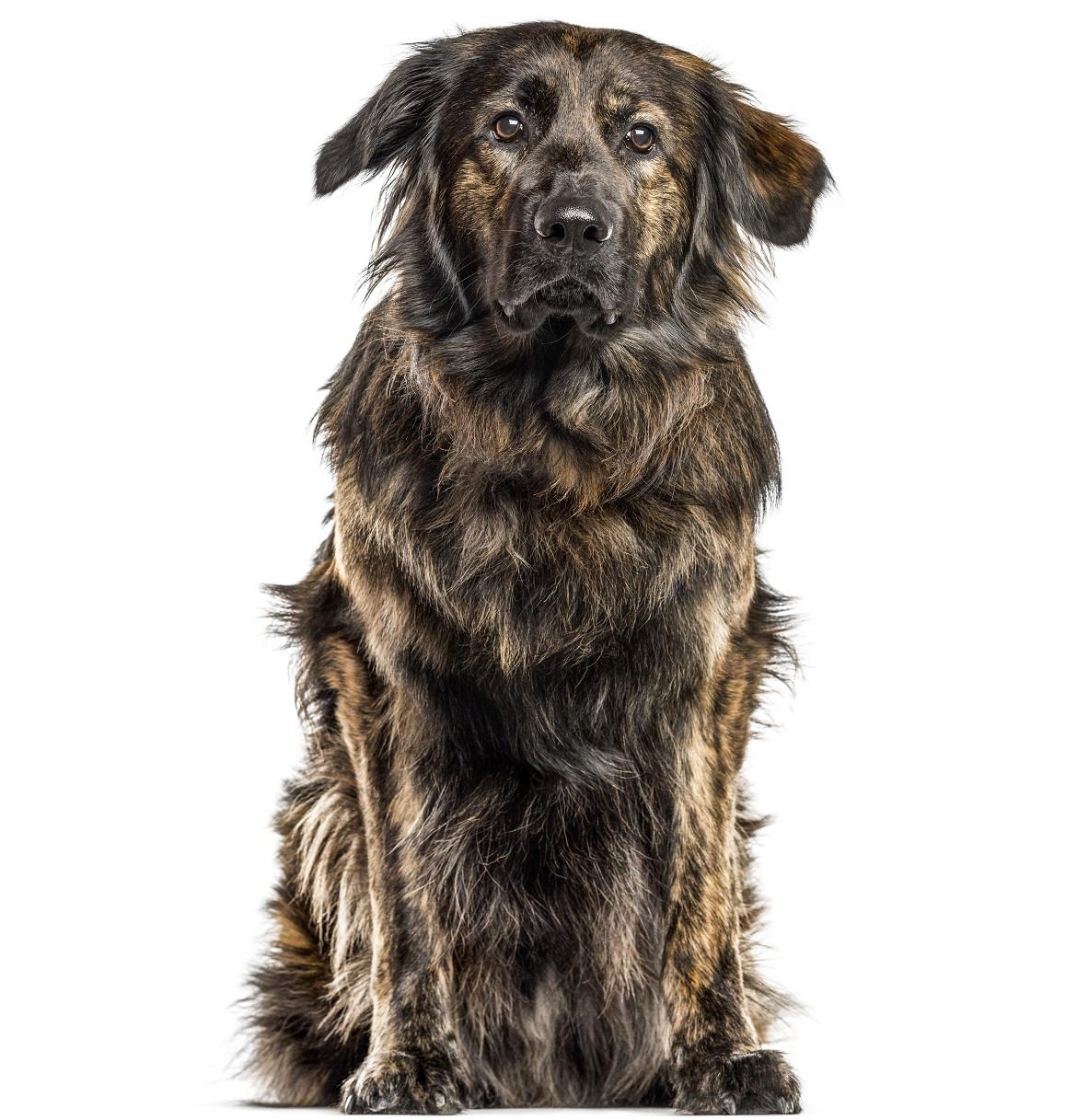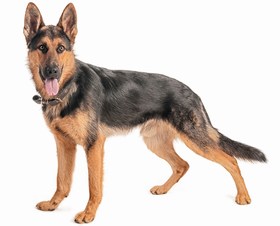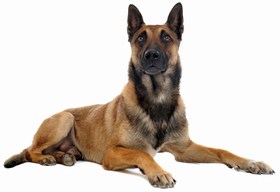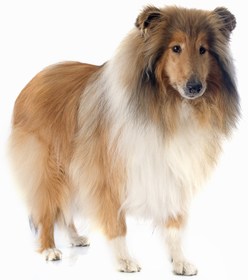
Paws ‘N’ Pups Quickview
Size
| Energy Level
| Trainability
| Paws ‘N’ Pups Rank
|
Characteristics
| Physical Characteristics: Height: 20-26” Weight: 60-85 lbs. Energy Level: High | Colors: The Golden Shepherd is found in the following colors:
|
Health & Longevity
Average Life Span: 10-14 years
The Golden Shepherd is a cross between the Golden Retriever and the German Shepherd. A good breeder will weed out many of the hereditary health issues from the parent breeds so it’s important to pick a breeder wisely. There are still a few health problems you should be aware of.
Joint issues like hip and elbow dysplasia may affect some Golden Shepherds. Both hip and elbow dysplasia are degenerative conditions resulting from malformed joints, and they often lead to problems such as discomfort, pain, and limping. In more severe cases, arthritis or even lameness can result, sometimes necessitating surgery. Although hereditary, hip dysplasia can be triggered by rapid weight gain or injury, such as falling on a slippery floor or landing incorrectly after jumping.
Hypothyroidism, a thyroid condition that occurs when the thyroid gland does not produce sufficient amounts of hormone, is also a possibility for the Golden Shepherd. Hypothyroidism can lead to issues such as lethargy, hair loss, obesity, and infertility. This condition can be treated, but it will require daily medication for the duration of the affected dog’s life.
Golden Shepherds may experience eye issues such as Progressive Retinal Atrophy (PRA) and cataracts. PRA is the gradual degeneration of the retina, ultimately resulting in failed daytime vision. Although there is no cure for PRA, affected dogs generally continue to lead happy lives. The gradual nature of the condition allows for an adjustment to failing vision.
Gastric torsion, more commonly called bloat, may impact some Golden Shepherds. Bloat occurs when the stomach fills with gas, fluid, or food, expanding dangerously and putting pressure on other organs. In some cases, the stomach flips, trapping blood in the stomach and preventing flow to the heart and other vital organs. Bloat can be deadly, so get your Golden Shepherd to the veterinarian right away if you notice symptoms such as pale gums, excessive drooling, failed attempts at vomiting, or a swollen stomach.
Other potential health problems for the Golden Shepherd include skin disorders, obesity, allergies, epilepsy, cancer, and some heart issues.
The average lifespan for a Golden Shepherd is 10-14 years.
Temperament & Train-ability
Like all hybrid breeds, the temperament of the Golden Shepherd may vary because he can exhibit any combination of characteristics common to his parent breeds. In general, the Golden Shepherd is extremely intelligent, loving, gentle, and loyal. He is a versatile dog who excels in many activities and dog sports such as search and rescue, military and police work, hunting, tracking, and drug detection. He may also be utilized as a therapy dog or guide dog.
Apartment living is not recommended for the Golden Shepherd because he is a large dog with high energy levels. He needs at least sixty to ninety minutes of physical exercise on a daily basis. He loves swimming and playing outdoors, and he will enjoy activities such as fetch, jogging, running, hiking, and going for long walks. An active, outdoorsy owner would be a good match for this breed.
The Golden Shepherd forms extremely strong bonds with his family and is an excellent family companion. He should live indoors around the people he loves. The Golden Shepherd is friendly and enjoys playing with children and other household pets. In some cases, Golden Shepherds may be slightly dog aggressive, but proper socialization can easily curb this behavior. He is typically cautious and reserved around strangers, making him a good watchdog. The Golden Shepherd’s guard dog capabilities depend on which parent he takes after: if he is more like the German Shepherd, he will be an excellent guardian, on the other hand Golden Retrievers are too friendly to be relied on for protection.
The Golden Shepherd is highly intelligent, eager to please his owner, and able to learn new commands very quickly. Both parent breeds are highly trainable, so this is typically the case with Golden Shepherds as well. Use positive reinforcement such as yummy treats, extra playtime, and encouraging verbal praise. Be consistent in enforcing your rules and expectations, and training the Golden Shepherd should be a positive experience.
Grooming
The Golden Shepherd has a long double coat that is most likely to resemble that of the Golden Retriever. Daily brushing is ideal to minimize shedding and reduce tangles and mats, but brushing a few times a week is probably sufficient. They will shed quite a bit throughout the year, and will experience particularly heavy shedding in the fall and spring.
The Golden Shepherd can easily develop a doggy odor, so bathing once a month is recommended. Trim his nails when they grow long enough to touch the ground in order to prevent overgrowth and cracking. Check his ears weekly for signs of infection such as redness, tenderness, and odor. Brush his teeth at least 2-3 times per week to maintain good overall health and prevent bad breath.
Diet
On average, the Golden Shepherd should consume 3-4 cups of high quality dry dog food daily. He is prone to obesity, so ensure that you are not overfeeding him. Remember that the ideal type and amount of food for your individual dog varies according to factors such as weight, metabolism, activity level, age, and build.
Take preventative measures against bloat by ensuring that your Golden Shepherd does not eat too rapidly, preventing him from drinking excessive amounts of water directly before or after eating, and enforcing a one-hour waiting period between eating and exercising. Do not allow him to eat from a raised bowl unless your veterinarian specifies otherwise.
Ensure that your Golden Shepherd has access to clean, fresh drinking water at all times.
Looking for a Golden Shepherd?
 Find A Golden Shepherd Breeder |  Golden Shepherd Puppies For Sale |  Adopt A Golden Shepherd |
Cost
The cost of a Golden Shepherd puppy is $350-$500 on average, although prices may vary according to gender, breeder location, and lineage.
If you adopt a Golden Shepherd, expect adoption fees to around $150-$200, depending on your location.
Paws ‘N’ Pups Ranking
Paws ‘N’ Pups ranks every breed out of 4 with 1 being easiest to integrate into your life and 4 being the toughest – The lower the ranking the better.
Ranking takes into account a few basic factors including cost, skill level needed, high vs low maintenance and how critical regular training is to success. The Golden Shepherd ranks a 3. He is a good-natured family companion who can get along well with most people and pets, and he is generally easy to train. However, he does need at least an hour of exercise daily, and he requires a lot of attention and companionship as well. He sheds quite a bit, and some may require a great deal of brushing.
Breeds Similar To Golden Shepherd
 Golden Retriever |  German Shepherd |  Belgian Malinois |  Collie |




